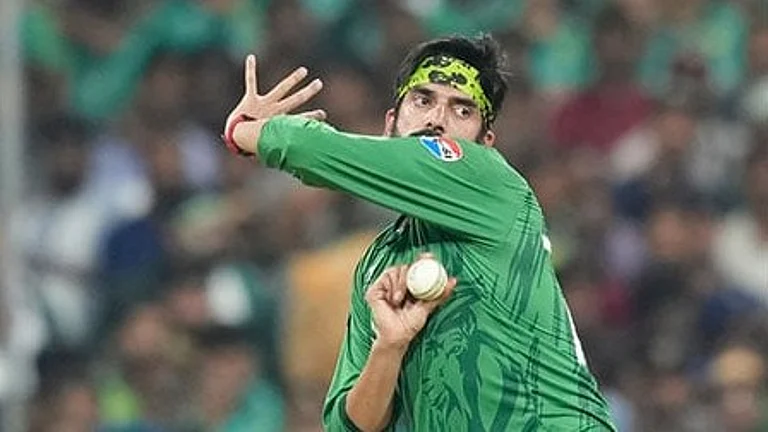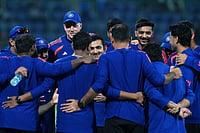One of Hindi films' most talented and versatile actresses - and still going strong, the exquisite and enchanting Waheeda Rehman, who caps a remarkable stint with the prestigious Dadasahab Phalke Award, carved out a niche with confident renditions of unconventional roles, including some very bold for the era - and could have spelled doom to her career.
Starting with Telugu and Tamil films in 1955 before switching over to Hindi cinema the following year, she did the usual roles expected of Hindi film actresses but also went on to play a prostitute, a gangster’s moll, a nautanki actress, a woman who walks out of a marriage without regrets, et al – but with such innate grace that she has always been a byword for refined sensibility.
Born in fairly comfortable circumstances - her father was a Deputy Commissioner - on February 3, 1939 in what was Chingalpet town of the Madras Presidency, Waheeda Rehman was the youngest of four sisters.
As a child, she learnt Bharat Natyam in school, and wanted to be a doctor, but following her father's untimely demise in 1951 and the state of the family finances, she was constrained to look at a screen career.
She did just 90-odd films, with the most recent appearance being in "Skater Girl" (2021), but her oeuvre reads like a honour roll of Hindi cinema - "Pyaasa" (1957), "Solva Saal" (1958), "Kaagaz Ke Phool" (1959), "Chaudhvin Ka Chand" (1960), "Sahib Bibi Aur Ghulam", "Mujhe Jeene Do", "Bees Saal Baad" (all 1962), "Guide", (1965), "Teesri Kasam" (1966), "Khamoshi" (1969), "Reshma aur Shera" (1971), "Kabhi Kabhie" (1976), "Trishul" (1978), "Namkeen" (1982), "Namak Halaal" (1982), "Chandni" (1989) and "Lamhe" (1991), to say the least.
She also has to her credit Satyajit Ray's "Abhijan" (1962).
In her roles, she not only became one of the few to act with the 'Big Three' of Indian films - Dilip Kumar, Raj Kapoor, Dev Anand (as well as his younger brother Vijay 'Goldie' Anand), but also with Guru Dutt, Rajendra Kumar, Sunil Dutt, Manoj Kumar, Dharmendra, Rajesh Khanna, and Amitabh Bachchan - with whom within the course of a decade, she played his romantic partner and then his mother!
Songs like "Kahin pe nigahen kahin pe nishana", "Hai apna dil to awara", "Ham aapki ankhon mein", "Aaj phir jeena ke tamanna hai", "Kahin deep jale kahin dil", "Paan khayen saiyan hamaro", "Rangeela re", among others, are testament to her rhythm and emoting capabilities.
Waheeda Rehman is the second actress to win Indian filmdom's top award in consecutive years (after Asha Parekh last year), the third actress to win after Durga Khote in 1983, the second leading lady to win since Kanan Devi in 1976, only the eighth woman in its over five-decade history, but the first recipient who is still active on screen.
While her ethereal beauty lit the screen in the many unforgettable roles she has essayed, Waheeda Rehman performed always on her terms.
Entering Hindi films, she was asked to take a screen name, in the tradition of Madhubala, Meena Kumari and Nargis, and so on, but she insisted her name was good enough and managed to get her own way.
Then, as she related in her biography, Nasreen Muni Kabir's “Conversations With Waheeda Rehman” (2014), as a mere teenager and not even of an age to legally sign a contract, Waheeda Rehmnan clashed with filmmakers Guru Dutt and Raj Khosla, insisting she be allowed to choose her costumes for "C.I.D" - where she played the gangster's (Bir Sakhuja) woman - and reject those she deemed unsuitable.
Though Khosla was taken aback at the gumption of someone who was far from an established star, Guru Dutt was more amenable to her concerns and agreed, thus launching her career.
And then in "Guide" - for whose English version, she took lessons in English diction from Pearl S. Buck herself - Waheeda Rehman refused to get too intimate with her hero.
As "Guide" author, R.K. Narayan recounts: “The director wanted the hero (Dev Anand) to kiss the heroine, who of course rejected the suggestion as unbecoming for an Indian woman.
"The hero, for his part, was willing to obey the director, but was helpless, since kissing is a cooperative effort. The American director realised that it is against Indian custom to kiss in public; but he insisted that the public in his country would boo if they missed the kiss.
"I am told that the heroine replied: 'There is enough kissing in your country at all times and places, off and on the screen and your public, I am sure, will flock to a picture where, for a change, no kissing is shown'. She stood firm."
Waheeda Rehman always stood her ground – Bollywood or Hollywood!


























